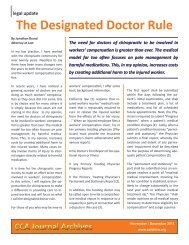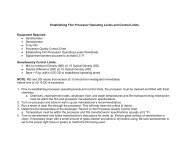Membership Directory - CCA Journal magazine
Membership Directory - CCA Journal magazine
Membership Directory - CCA Journal magazine
You also want an ePaper? Increase the reach of your titles
YUMPU automatically turns print PDFs into web optimized ePapers that Google loves.
code of ethics<br />
code of ethics<br />
INTRODUCTION<br />
The California Chiropractic Association’s (<strong>CCA</strong>) Code of Ethics consists of an Introduction,<br />
a Preamble, General Principles, Sanctions, specific Rules of Ethics,<br />
and Administrative Procedures. The Introduction discusses the intent, organization,<br />
procedural considerations, and scope of application of the Code of Ethics.<br />
The Preamble and General Principles are aspirational goals to guide Doctors of<br />
Chiropractic toward the highest ideals of chiropractic practice. Although the<br />
Preamble and General Principles are not themselves enforceable rules, they<br />
should be considered by Doctors of Chiropractic in arriving at an ethical course<br />
of action and may be used by ethics bodies in interpreting the Ethical Standards.<br />
The Ethical Standards are written to address specific issues of conduct in a variety<br />
of role applications and they may vary in use depending upon the context.<br />
The Ethical Standards are not exhaustive and should be viewed as a living document<br />
subject to periodic review as needed. The fact that a given conduct is not<br />
specifically addressed by the Code of Ethics does not mean that it is necessarily<br />
either ethical or unethical.<br />
<strong>Membership</strong> in the <strong>CCA</strong> commits members to adhere to the <strong>CCA</strong> Code of Ethics<br />
and to the rules and procedures used to implement it. A members acceptance<br />
in the <strong>CCA</strong> ensures that they will remain accountable for any ethics action initiated<br />
during their membership although they may terminate their membership<br />
at a time subsequent to the action.<br />
The Code of Ethics applies only to a Doctor of Chiropractic’s work-related activities,<br />
that is, activities that are a part of the doctor’s scientific and professional<br />
functions or that are chiropractic in nature. It includes the clinical or treatment<br />
practice of chiropractic, research, teaching, supervision of trainees, development<br />
of assessment instruments, conducting assessments, educational counseling,<br />
organizational consulting, social intervention, administration, professional<br />
association and other activities as well. Purely private conduct is not addressed<br />
in the Code of Ethics except as it applies to actions of the Board of Chiropractic<br />
Examiners as related to in the Administrative Procedures.<br />
The Code of Ethics is intended to provide standards of professional conduct that<br />
can be applied by the <strong>CCA</strong> and any other bodies that may choose to adopt them.<br />
Whether or not a Doctor of Chiropractic has violated the Code of Ethics does not<br />
by itself determine whether he or she is legally liable in a court action, whether<br />
a contract is enforceable, or whether other legal consequences occur. However,<br />
compliance with or violation of the Code of Ethics may be admissible as evidence<br />
in some legal proceedings, depending on the circumstances.<br />
In the process of making decisions regarding their professional behavior, Doctors<br />
of Chiropractic must consider this Code of Ethics, in addition to applicable<br />
laws and the Board of Chiropractic Examiners’ regulations. If the Code of Ethics<br />
establishes a higher standard of conduct than is required by law, Doctors of<br />
Chiropractic must meet the higher ethical standard.<br />
If the Code of Ethics standard appears to conflict with the requirements of the<br />
law, then Doctors of Chiropractic make known their commitment to the Code of<br />
Ethics and take steps to resolve the conflict in a responsible manner. If neither<br />
law nor the Code of Ethics resolves an issue, Doctors of Chiropractic should consider<br />
other professional material and the dictates of their own conscience, as<br />
well as seek consultation with others within the field when it is practical.<br />
The procedures for filing, investigating, and resolving complaints of unethical<br />
conduct and inquiries are described in the Administrative Procedures section.<br />
The actions that the <strong>CCA</strong> may take for violations of the Code of Ethics include<br />
actions such as reprimand, censure, probationary membership, termination of<br />
<strong>CCA</strong> membership, and referral of the matter to other bodies. Complainants who<br />
seek remedies such as monetary damages in alleging ethical violations by a Doctor<br />
of Chiropractic must resort to private negotiation, administrative bodies, or<br />
the courts. Actions that violate the Code of Ethics may lead to the independent<br />
imposition of sanctions on a Doctor of Chiropractic by bodies other than the<br />
<strong>CCA</strong>, in separate actions unrelated to the <strong>CCA</strong> ethics procedures.<br />
PREAMBLE<br />
The ultimate purpose of the California Chiropractic Association’s Code of Ethics<br />
is to ensure that the people of the State of California will receive the highest<br />
quality chiropractic health care from its members who subscribe to the epitome<br />
of ethical conduct.<br />
Doctors of Chiropractic work to develop a valid and reliable body of scientific<br />
knowledge based on research. They may apply that knowledge to health care in<br />
a variety of contexts. In doing so, they perform many roles, such as researcher,<br />
educator, diagnostician, treatment provider, supervisor, consultant, administrator,<br />
social interventionist, and expert witness. Their goal is to broaden knowledge<br />
of health care and, where appropriate, to apply it pragmatically to improve<br />
the condition of both the individual and society. Doctors of Chiropractic respect<br />
the central importance of freedom of inquiry and expression in research, teaching,<br />
and publication. They also strive to help the public in developing informed<br />
judgments and choices concerning health care. This Code of Ethics provides a<br />
common set of values upon which Doctors of Chiropractic base their professional<br />
and scientific work.<br />
This Code of Ethics is intended to provide both the general principles and the<br />
decision rules to cover most situations encountered by Doctors of Chiropractic.<br />
It has as its primary goal the welfare and protection of the individuals and<br />
groups with whom chiropractors work. It is the individual responsibility of each<br />
chiropractor to aspire to the highest possible standards of conduct. Doctors of<br />
Chiropractic respect and protect human and civil rights, and do not knowingly<br />
participate in or condone unfair discriminatory practices.<br />
The development of a dynamic set of ethical standards for a Doctor of Chiropractic’s<br />
work-related conduct requires a personal commitment to a lifelong<br />
effort to act ethically: to encourage ethical behavior by students, preceptors,<br />
supervisors, employees, and colleagues, as appropriate; and to consult with<br />
others, as needed, concerning ethical problems. Each Doctor of Chiropractic<br />
supplements, but does not violate the Code of Ethics’ values and rules on the<br />
basis of guidance drawn from personal values, culture, and experience.<br />
GENERAL PRINCIPLES<br />
The General Principles section of the Code of Ethics forms the aspirational and<br />
inspirational model standards of exemplary professional conduct for all members.<br />
They serve as goals that the California Chiropractic Association members<br />
should constantly strive to reach. Although not in themselves enforceable, they<br />
form the framework for most ethical decisions.<br />
A. Ethics in Chiropractic<br />
An issue of ethics in chiropractic is resolved by the determination that the best<br />
interest of the patient is served.<br />
B. Integrity in Chiropractic<br />
The Doctor of Chiropractic seeks to promote integrity in the science, art, philosophy,<br />
teaching, and practice of chiropractic. In these activities the Doctor<br />
of Chiropractic is honest, fair, and respectful of others. Those Doctors of Chiropractic<br />
who behave unethically, or who engage in fraud or deception, should be<br />
identified to appropriate authorities.<br />
C. Competence in Chiropractic<br />
The Doctor of Chiropractic must maintain competence by continued study. They<br />
recognize the boundaries of their particular competencies and the limitations of<br />
their expertise. They provide only those services and use only those techniques<br />
for which they are qualified by education, training, or experience. The Doctor of<br />
Chiropractic is cognizant of the fact that the competencies required in serving,<br />
teaching, and/or studying groups of people vary with the distinctive characteristics<br />
of those groups. In those areas where recognized professional standards<br />
do not yet exist, the Doctor of Chiropractic exercises careful judgment and takes<br />
appropriate precautions to protect the welfare of those with whom he/she works.<br />
They maintain knowledge of relevant scientific and professional information related<br />
to the services they render, and recognize the need for ongoing education.<br />
The Doctor of Chiropractic makes use of scientific, professional, technical, and<br />
administrative resources.<br />
D. Professional Responsibility in Chiropractic<br />
Open communication with the patient is essential. Patient confidences must<br />
be safeguarded within the constraints of the law. Doctors of Chiropractic uphold<br />
professional standards of conduct, clarify their professional roles and obligations,<br />
accept appropriate responsibility for their behavior, and adapt their<br />
methods to the needs of different populations. Doctors of Chiropractic consult<br />
with, refer to, or cooperate with other professionals and institutions to the extent<br />
needed to serve the best interests of their patients and other recipients of<br />
their services. The moral standards and conduct of a Doctor of Chiropractic are<br />
personal matters to the same degree as is true for any other person, except as<br />
their conduct may compromise their professional responsibilities or reduce the<br />
public’s trust in chiropractic or Doctors of Chiropractic. When appropriate, they<br />
consult with colleagues in order to prevent or avoid unethical conduct.<br />
E. Commercial Relationships in Chiropractic<br />
Fees for chiropractic services must not exploit patients or others who pay for<br />
their services. Doctors of Chiropractic seek to contribute to the welfare of those<br />
with whom they interact professionally. Doctors of Chiropractic are sensitive<br />
to real and ascribed differences in power between themselves and others, and<br />
they do not exploit or mislead other people during or after professional relationships.<br />
SANCTIONS<br />
Perhaps the most onerous and difficult task of an ethics reviewer is using the<br />
sanctions provided within the Code of Ethics in dealing with behavior found<br />
unsuitable in their colleagues. It requires the careful and thoughtful consideration<br />
of the behavior and the context in which the behavior was exhibited. It is<br />
with this consideration in mind, that a range of sanctions is suggested for each<br />
area in which there was an ethical infraction. These guidelines are suggested<br />
only, as the ethical reviewer must ultimately be given the latitude, within the<br />
consensus process, to express their own particular degree of concern for the<br />
exhibited behavior.<br />
The sanctions listed below are not meant to be exhaustive and it is expected that<br />
they will be reviewed periodically and perhaps expanded upon.<br />
Sanctions:<br />
1. Reprimand<br />
This is a written reprimand from Ethics Committee Chairperson indicating the<br />
areas of ethics violation. Reprimand is the appropriate sanction if there has<br />
been an ethics violation but the violation was not of the kind to cause harm<br />
to another person or to cause substantial harm to the profession, and was not<br />
otherwise of sufficient gravity to warrant a more severe sanction.<br />
2. Censure<br />
Censure is the appropriate sanction if there has been an ethics violation, and<br />
the violation was of a kind likely to cause harm to another person, but the violation<br />
was not likely to cause substantial harm to that person or to the profession,<br />
and was not otherwise of sufficient gravity to warrant a more severe sanction.<br />
3. Censure With Publication<br />
Censure with publication in either the <strong>CCA</strong> <strong>Journal</strong> or other appropriate publication<br />
is a sanction which may be used if there has been an ethics violation whose<br />
severity warrants more than censure alone and the publication of which would<br />
serve to alert other members and recipients of these publications of the ethical<br />
violations of that member.<br />
4. Suspension of <strong>Membership</strong><br />
Suspension for a fixed period of time may be an appropriate sanction if there<br />
has been an ethics violation, and the violation was likely to cause substantial<br />
harm to another person and the profession. Suspension from <strong>CCA</strong> is also to be<br />
used in the event that the State Board of Chiropractic Examiners suspends the<br />
member’s license. The <strong>CCA</strong> suspension shall run coterminous-with the State<br />
Board suspension. The suspension time may be for a fixed time and/or until<br />
conditions specified by the Ethics Committee are met.<br />
5. Drop From <strong>Membership</strong><br />
Dropping from membership in the <strong>CCA</strong> may be used if there has been an ethics<br />
violation, and the violation was likely to cause substantial harm to another<br />
person and the profession. Dropping from membership is also to be used in the<br />
event that the State Board of Chiropractic Examiners finds that the member’s license<br />
is to be revoked and shall run coterminously with such revocation. (Refer<br />
to <strong>CCA</strong> Bylaws regarding membership termination.)<br />
Directives:<br />
The following are additional sanctions referred to as directives which will allow<br />
the appropriate ethics body to apply directed action by the member who has<br />
violated the Code of Ethics.<br />
A. Cease and Desist Order<br />
Such a directive requires that the Subject Member cease and desist the specific<br />
unethical behavior.<br />
B. Supervision Requirement<br />
Such a directive requires that the Subject Member be supervised. This may take<br />
the form of indirect supervision where another member is reported to by the<br />
Subject Member on a periodic basis for a specified time frame.<br />
C. Education, Training or Tutorial Requirement<br />
Such a directive requires that the Subject Member engage in education, training,<br />
or a tutorial specified by the reviewing body.<br />
D. Probation<br />
Such a directive requires monitoring of the Subject Member by the Committee<br />
to ensure compliance with Code of Ethics mandated directives. Probation is also<br />
to be used in the event that the State Board of Chiropractic Examiners places the<br />
Subject Member on probation and the <strong>CCA</strong> probation shall run coterminously<br />
with the State Board probation.<br />
RULES OF ETHICS<br />
1. GENERAL STANDARDS<br />
1.01 Applicability of the Code of Ethics<br />
The activity of a Doctor of Chiropractic subject to the Code of Ethics may be<br />
reviewed under these Rules of Ethics only if the activity is part of his or her<br />
work-related functions or the activity is chiropractic in nature. Personal activities<br />
having no connection to or effect upon chiropractic roles are not subject to<br />
the Code of Ethics.<br />
Suggested Sanction(s)/Directive(s): 1, A<br />
1.02 Relationship of Ethics and Law<br />
If a Doctor of Chiropractic’s ethical responsibilities conflict with law, Doctors of<br />
Chiropractic make known their commitment to the Code of Ethics and take steps<br />
to resolve the conflict in responsible manner.<br />
Suggested Sanction(s)/Directive(s): 1, A<br />
1.03 Professional and Scientific Relationship<br />
Doctors of Chiropractic provide diagnostic, therapeutic, teaching, research, supervisory,<br />
consultative, or other chiropractic services in the context of a defined<br />
professional or scientific relationship or role. (See also Standards 2.01, and 7.02<br />
Forensic Assessments.)<br />
Suggested Sanction(s)/Directive(s): 1, 2, A<br />
1.04 Boundaries of Competence<br />
(a) Doctors of Chiropractic provide services, teach, and conduct research within<br />
the boundaries of their competence, based on their education, training, supervised<br />
experience, or appropriate professional experience.<br />
Suggested Sanction(s)/Directive(s): 1, 2, A, B, C<br />
(b) Doctors of Chiropractic provide services, teach or conduct research in new<br />
areas or involving new techniques after first undertaking appropriate study,<br />
training, supervision, and/or consultation from persons who are competent in<br />
those areas or techniques.<br />
Suggested Sanction(s)/Directive(s): 1, 2, A, B, C<br />
(c) In those emerging areas in which generally recognized standards for preparatory<br />
training do not yet exist, Doctors of Chiropractic nevertheless take reasonable<br />
steps to ensure the competence of their work and to protect patients, student,<br />
research participants, and others from harm.<br />
Suggested Sanction(s)/Directive(s): 1, 2, 3, 4, 5, A, B, C<br />
1.05 Maintaining Expertise<br />
Doctors of Chiropractic who engage in assessment, treatment, teaching, research,<br />
organizational consulting, or other professional activities maintain a<br />
reasonable level of awareness of current scientific and professional information<br />
in their fields of activity, and undertake ongoing efforts to maintain competence<br />
in the skills they use.<br />
Suggested Sanction(s)/Directive(s): 1, C<br />
1.06 Basis for Scientific and Professional Judgments<br />
Doctors of Chiropractic rely on scientifically and professionally derived knowledge<br />
when making scientific or professional judgments or when engaging in<br />
scholarly or professional endeavors.<br />
Page 142 California Chiropractic Association 2010-11 <strong>Membership</strong> <strong>Directory</strong> Page 143
















